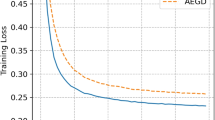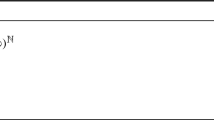Abstract
A correction regarding [Latz 2021, Stat. Comput. 31, 39].
Similar content being viewed by others
Avoid common mistakes on your manuscript.
In Latz (2021), the space of continuous paths \(C^0([0, \infty ); X)\) needs to be equipped with the metric given by
rather than the supremum norm \(\Vert x\Vert _\infty = \sup _{t \in [0,\infty )}\Vert x(t)\Vert \), see Kushner (1984). This has the following implications:
(1) The convergence results in Theorem 1 and Lemma 2 are now weaker, as the metric \(\rho \) is weaker than the metric induced by \(\Vert \cdot \Vert _\infty \).
(2) Proposition 4(i) does not hold uniformly in time. The function F in the proof of this proposition can be chosen as \(F((\xi (t), \tau (t), {\varvec{j}}(t))_{t \ge 0},t):= \min \{1, \Vert \xi (t)\Vert \}2^{-(t+1)}\) – it now depends on t. This F is bounded and Lipschitz continuous in \((\xi (t))_{t \ge 0}\) with respect to \(\rho \), continuous in \(t>0\) and constant with respect to the other inputs. To show Lipschitz continuity, we observe
for \(t > 0\), \((\xi (t))_{t \ge 0}, (\xi '(t))_{t \ge 0}, (\tau (t))_{t \ge 0}, (\tau '(t))_{t \ge 0} \in C^0([0, \infty ); X)\) and \(({\varvec{j}}(t))_{t \ge 0}, ({\varvec{j}}'(t))_{t \ge 0}\) being Markov jump processes on I. Thus, the weak convergence shown in Lemma 2 now implies that
and the inequality in Proposition 4(i) now reads
with \(\alpha (0,t) = 0\) and \(\varepsilon \mapsto \alpha (\varepsilon , t)\) is continuous at 0 for any \(t>0\).
We also note that this \(\alpha '\) can depend on the initial values \(\xi _0\) and \(j_0\) and that the definition of \(t_0\) in this proposition is not necessary.
(3) Theorem 4 is still correct as stated with a refined argument in the proof. In the last inequality of the proof of Theorem 4, we can choose \(\varepsilon _t\) to depend on t. The continuity of \(\alpha '\) and \(\alpha ''\) implies that for any \(\delta > 0\), we can find \(\varepsilon _t > 0\) small enough such that \(\alpha '(\varepsilon _t,t) + \alpha ''(\varepsilon _t) \le \delta \) for all \(t > 0\), which is sufficient to prove convergence as stated in Theorem 4.
Data availability
No datasets were generated or analysed during the current study.
References
Kushner, H.J.: Approximation and Weak Convergence Methods for Random Processes with Applications to Stochastic Systems Theory. MIT Press (1984)
Latz, J.: Analysis of stochastic gradient descent in continuous time. Stat. Comput. 31, 39 (2021)
Acknowledgements
JL thanks Chenguang Liu for helpful discussions supporting these corrections.
Author information
Authors and Affiliations
Corresponding author
Ethics declarations
Conflict of interest
The authors declare no Conflict of interest.
Additional information
Publisher's Note
Springer Nature remains neutral with regard to jurisdictional claims in published maps and institutional affiliations.
Rights and permissions
Open Access This article is licensed under a Creative Commons Attribution 4.0 International License, which permits use, sharing, adaptation, distribution and reproduction in any medium or format, as long as you give appropriate credit to the original author(s) and the source, provide a link to the Creative Commons licence, and indicate if changes were made. The images or other third party material in this article are included in the article’s Creative Commons licence, unless indicated otherwise in a credit line to the material. If material is not included in the article’s Creative Commons licence and your intended use is not permitted by statutory regulation or exceeds the permitted use, you will need to obtain permission directly from the copyright holder. To view a copy of this licence, visit http://creativecommons.org/licenses/by/4.0/.
About this article
Cite this article
Latz, J. Correction to: analysis of stochastic gradient descent in continuous time. Stat Comput 34, 146 (2024). https://doi.org/10.1007/s11222-024-10450-4
Received:
Accepted:
Published:
DOI: https://doi.org/10.1007/s11222-024-10450-4




